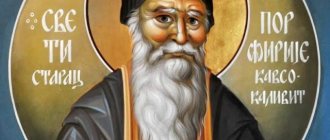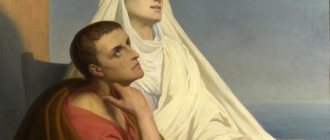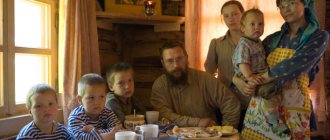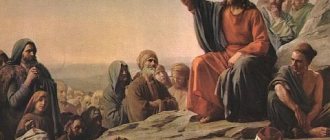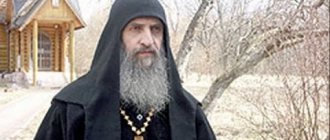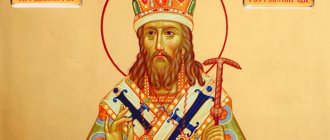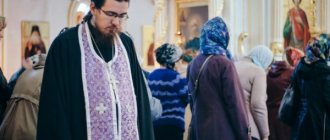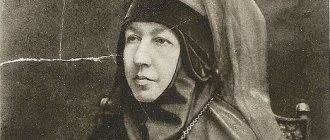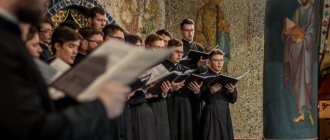Dear readers, for many years I have been collecting stories about modern elders and ascetics of our day. All the stories below were either born from my impressions and meetings with the elders, or were conveyed to me by close friends, priests and wonderful, bright parishioners. I'm happy to share with you!
Elder Dionysius and the girl's work
A kind and diligent girl named Natalia studied at a medical university. In her second year, she was offered a part-time job in hematology. She, being a timid person, was worried that nothing would work out for her and that she would be offended and scolded. The fact is that in childhood and adolescence Natalia was tormented a lot by her parent, convincing her that she was a useless fool, and this awareness of her own worthlessness tormented the girl constantly. She wrote a letter to Elder Dionysius saying that she was going back to work, and the Elder answered her: “Congratulations! Everything will work out perfectly for you.” Reading these lines, Natasha cried, but the pain immediately went away, because the girl felt that her life mattered to the Lord.
Elders Ephraim and Paisios
In Arizona, the elders Ephraim Philotheus and Paisios live in the monastery of St. Anthony.
This is how my friend Victoria B. from America talks about them.
I saw Elder Ephraim briefly, at a common meal and in the temple I went up for a blessing in the dark. In the monastery, the service begins at 1 am and lasts until 3.30-4 am. Services are held without light or candles. I asked people about the old man, they said that he was the sun, very kind and bright. Rays of light emanate from his face. I was privileged to meet Elder Paisia on each of our visits to the monastery (the 3rd was this time). He blessed us with the cross and miraculous myrrh, which was given to him on Mount Athos. I felt the warmth emanating from the cross, and I just wanted to say, “Lord Jesus Christ, have mercy on me, a sinner.” At first glance, Elder Paisios seems a little stern, but I think this is because of his black beard, streaked with gray. He is short, younger than Elder Ephraim (he is said to be 88 years old). I noticed that Elder Paisios was ready to help everyone and put aside his important matters for the sake of people who dared to detain him and ask him for anything. He is also understanding and sensitive...
An unusual prophecy of Elder Nektarios about the future of Russia
Estimated reading time: 3 minutes.
The last years of the existence of the Optina Hermitage fell on troubled times - the First World War, revolutionary unrest among the workers, in the army, peasant unrest, confusion among the intelligentsia, and finally, the abdication of the sovereign... Beginning in 1912, the spiritual mentor of the brethren in Optina was Elder Nektary.
The words and actions of this strangely dressed foolish monk seemed incomprehensible to people, even frightening. But he received the blessing of the elders for his foolishness and under his absurd behavior he hid his amazing spiritual gifts - the ability to help people with advice, strengthen them in faith, console them and warn them about future trials. The smartest and most educated man of his time, the elder spent a quarter of a century in seclusion and read thousands of books over the years. Nektary not only realized what was happening, but, anticipating an impending catastrophe, revolution, civil war, in his own language he warned about the future of Russia, which he dearly loved and for which he constantly prayed.
One day such a story happened to him...
In the monastery everyone got used to the elder’s foolishness. Sometimes he would put on a colored knitted jacket over his cassock - awkward, out of size - and walk around the monastery. Otherwise he’ll throw a robe over his naked body, a red bow over his chest, and show off, embarrassing the brethren. During the meal he plays pranks: he pours sour, sweet, and salty things into one bowl, and eats and praises! He even got himself a gramophone - he wanted to play records in the monastery, but the monastery authorities found out and did not allow it. He brought all sorts of rubbish into the cell - pebbles, glass, clay, put it in a cabinet and began to brag to everyone: “Look, what a museum I have!”
But in the 1910s, Bishop Feofan of Kaluga came to Optina. The distinguished guest entered the cell of Elder Nektarios with outright distrust. Theophanes did not believe in the holiness of the new clairvoyant, about which the bishop was repeatedly reported. And he was not deceived in his assumptions: when the bishop looked into the cell, Nektary was there... playing with toys! He didn’t even raise his head to the Metropolitan, as if he didn’t exist. Nektarios's entire cell was filled with children's trinkets - airplanes, cars, trains, steamships... Now the monk has laid out the dolls in front of him. I took one. He muttered something angrily, Feofan could barely make out the words: “Go to prison! On camera! That’s it!” He took another: “I’ll punish you too!” Bad!” He started hitting the third one: “So you’ll know!”
One can imagine what the bishop was thinking about as he left the elder’s cell. What holiness there is! Senile infirmity, and nothing more. Apparently, Nektary has lost his mind...
Years have passed. After the revolution of the seventeenth year, the meaning of Nektarios’ strange actions began to be revealed to people. The monastery was turned into a museum (“Look what a museum I have!”). Students, female students and office workers, due to the poverty of the Civil War, began to go to work barefoot, wearing coats over torn underwear, but each had a red bow on his chest (exactly like the old man). And what happened to Bishop Theophan, who was so amazed at Nektarios’ dolls? He ended up in exile. He lived in the house of a cruel owner named Plokhin, and suffered greatly from his inhuman treatment. In 1937, Feofan was arrested. In the special corps of the Nizhny Novgorod prison, the bishop was brutally tortured - they beat him, put him in a basement cell, which was filled with water. It was then that Feofan remembered the Optina holy fool: “I am a sinner before God and before the elder: everything I said was about me, and I thought he was crazy...” In October 1937, Metropolitan Feofan was shot.
Read about the spiritual path and miracles of Elder Nektarios of Optina in the magazine “Thomas”:
Father Nektary sat on the floor and played with dolls - the extraordinary story of one of the last Optina elders
Elders and works
Work for a person is most often a kind of punishment and torment. Even in monasteries, work is often exhausting rather than inspiring. Meanwhile, work could bring a person inspiration, which arises when we do what is natural to us. Therefore, it is easy for people to work in the abodes of the elders and next to them, because work here is filled with the meaning of creating new beauty in what is close to the human soul. Abba Dorotheos once wrote that nine-tenths of our attention should be paid to the structure of the soul, so that it is peaceful and ascends to the light when we perform service, and only one-tenth to the result. This is the deepest wisdom, since the luminosity of what we create directly depends on the content of the heart, including cooking dinner or gardening. I have often noticed that the work blessed by the elders becomes a cause for rejoicing for people, so much so does it coincide with their individual ability to bring new beauty into the world.
Overcoming pain
Saint Mark the Ascetic says that the causes of all our suffering are in our thoughts. It can be added that the gloomy thoughts are rooted in the fact that even an Orthodox person, as a rule, has to learn to trust God when pain comes into life.
Although in fact, trust in God gives a person the opportunity to live in a heavenly state of spirit while still on earth. Abba Dorotheus always said: “I want everything to be as it will be.” This phrase, strange at first glance, is full of deep meaning. After all, if a person believes that Christ really died and rose again specifically for him, then one can also believe that love will never allow evil to those it loves. The Gospel brings to us the words of Christ: “If you, being evil, know how to give good gifts to your children, how much more will your Father in heaven give good things to those who ask Him” (Matthew 7:11). And in the Old Testament people were invited to look at previous generations and find at least one person who trusted the Lord and was ashamed. And if we turn to what we have already experienced and experienced ourselves, we will see that we have always been protected and loved. When creating the world, the Lord calculated everything in it, right down to the last Brownian motion of a particle. We are “more precious than many small birds.”
One of my friends was worried and didn’t know whether to leave the city or not. Any decision seemed unbearably bitter to her: staying would mean living in fear, and leaving would mean enduring insults from relatives. In a confusion of feelings, she called Elder Dionysius in Greece. The elder was at a service and could not talk to her, but began to pray for her. And the girl suddenly felt the deep inner peace of her soul. Her heart was filled with the thought: no matter what decision she made, God would be on her side, He would protect and warm her. No pain, no death itself can touch the one from whom the Lord takes away trouble.
How can we feel that the Heavenly Father protects and loves us? This can be done through personal prayer, personal conversation with the Creator. Open to Him your current state of mind, and help will certainly come, as it has come to hundreds of millions of other people in the history of this world, where no misfortune and pain can be stronger than the hope in the One who loved us.
By the bookshelf. Women's confession. True stories about visiting Russian elders
Audio |
When a person begins to think about life, about why everything is going wrong for him, sooner or later his thoughts turn to God, to the Church. And so he comes to the temple, and there he learns that it is not enough to just be baptized, but you need to constantly cleanse your heart of all evil through the Sacrament of Repentance. At this stage, many people have a question: “Why tell the priest about your bad deeds? Does the Lord really not hear me? The Monk Ephraim the Syrian answers this question like this: “God wants to hear our sins from us, not because he does not know them. On the contrary, He wants us to realize our own sins through confession.” Thus, confession is necessary for us so that we can see our sins and passionate inclinations, and can fight them. This is what, for example, the authors of the memoirs that were collected in the book “Women’s Confession” did. Uninvented stories about visiting Russian elders." It was published by the Kovcheg publishing house and took its place on our bookshelf.
***
The authors of the memoirs collected in this book - nuns, mothers of families, Orthodox wives and virgins - talk about meetings with Russian elders, about the teachings and spiritual instructions they received at confession, about elder care. The book opens with the memoirs of Elizaveta Nikolaevna Pazukhina, who visited St. Seraphim of Sarov and confessed to him. Briefly, the publishers tell the following about her: “Elizaveta Nikolaevna came from the family of the poet-fabulist and critic I. I. Dmitriev. She was married to Pyotr Sergeevich Pazukhin, a collegiate adviser (a significant rank equal to an army colonel), a cousin of the historian N.M. Karamzin. The Pazukhin family, which owned the Simbirsk villages of Volostnikovka and Vyrypaevka (where their neighbors were relatives of N.A. Motovilov), was famous for its piety. There was a house church on the estate, and in 1856, after the death of her husband, Elizaveta Nikolaevna built a wooden church in the name of the Holy Trinity in the village of Vyrypaevka.
And here’s what Elizaveta Nikolaevna herself says: “From early childhood, I heard a lot about the insight and holiness of the Sarov recluse and hermit Father Seraphim, and therefore I really wanted to look at him and accept his blessing. My desire was finally fulfilled, by the grace of God, in 1830.” Arriving in Sarov, she, along with many other visitors to Sarov, after the early Liturgy, went to the elder’s cell and saw that the cell door was locked from the inside. “It was a sign,” writes Elizaveta Nikolaevna, that the elder stayed at home (and did not go into the forest wilderness), and we decided to ask him for his blessing to see him and be consoled by his soul-saving word. But none of us dared to be the first to say a prayer. Some tried, but the door did not open.
Finally, the author says, I turned to the lady standing next to me, right at the door, with her little daughter, so that she would make the little one say a prayer, saying that she was more worthy than all of us. And as soon as the little one said a prayer, at that very moment the door opened. But what was our common fear when Father Seraphim, having opened the door, began to close it again! I stood closest to the doors and fell into complete despair, thinking: Lord! It’s true that I’m more unworthy than anyone else, that when he saw me, he decided to shut himself up again. But as soon as I thought this, Father Seraphim, standing in the half-closed door, turned to me and said: “Calm down, mother, calm down, be patient a little,” and after that, opening the door a second time, he turned to me again and asked: “ Please, mother; tell me, what is your need? What do you want? I cried with joy and told him that I had one desire - to accept his blessing and ask for his holy prayers. Then he immediately blessed me and said: “The Lord bless you; His grace is with you." So Elizaveta Nikolaevna was warmly greeted by the elder, and how her confession took place, read on the pages of this book.
What follows is a description of Glafira Zhdanova’s confession to St. Ambrose of Optina. As the publishers write, “Schema-nun Anna (in the world Glafira Orestovna Zhdanova) was one of the spiritual children of St. Ambrose of Optina. Glafira first turned to the Monk Ambrose for advice in 1864 at the age of sixteen, and since then she constantly consulted with the elder and confessed to him. In 1878, Glafira Zhdanova became a novice at the Belevsky Monastery, regularly confessed to Father Ambrose, and, according to the custom of the sisters, after each confession, from fresh memory, she wrote down the advice of the elder heard during confession. These records are also presented on the pages of this publication.
Let's read some of them. Most often, the elder tells the novice: “Never judge anyone. Say: “I am guilty of condemnation, annoyance, conceit, disobedience, vanity, reproach, anger.” Walk the path of truth. Avoid lying and jokingly. Don't blame anyone. As much as possible and always try to reproach yourself and not blame anyone. Well, just think: why, even though you speak in good conscience, you are not at peace when you blame people, but when you reproach yourself, you are at peace. And from this we can only understand that when you remain silent, you are at peace, but when you accuse, you are restless. Don't blame anyone. Saint John Chrysostom writes: “If you want to know yourself, get to know yourself from your enemies”... not those enemies (demons), but from those who are not well disposed towards you. Those who are unkind to you will show all your weaknesses, just improve.
Another elder, addressing Glafira, Fr. “Be merciful to those who live with you, and you will receive the same mercy of God and you will be in the Kingdom of Heaven.” He also advised: “Live simpler. Keep yourself simple and treat everyone simply. He who simply lives finds it easier to believe, love and practice all other virtues. It’s not for nothing that they say: “Where it’s simple, there are a hundred Angels, but where it’s sophisticated, there’s not a single one.” Glafira Zhdanova heard a lot of other spiritual advice in confession from Elder Ambrose, and read which ones exactly on the pages of this book.
Next you will find Mrs. NN’s diary entries about confession with the Monk Ambrose of Optina, memories of his spiritual daughter about confession and spiritual guidance from the elder, and other believing women who turned to the monk for advice and support in spiritual life. One of them, recalling the words of the Gospel: “You did not choose Me, but I chose you” (John 13:1), writes the spiritual daughter of the elder.
So, several pages of this book talk about St. Ambrose of Optina. And then readers, together with the authors of the memoirs, will attend confession with the holy Optina elders: Barsanuphius, Anatoly, Nektarios, righteous John of Kronstadt and Alexy of Moscow, Rev. Alexy Zosimovsky and Andronik Glinsky, archpriests Nikolai Golubtsov and Nikolai Guryanov. This edition concludes with “The Confessional Paper that Archimandrite John (Krestyankin) gave to his spiritual children” and “Instructions for wives after confession, compiled from handwritten Trebniks of the 16th and 17th centuries.”
***
At the end of the program, let us again remember the words of St. Ephraim the Syrian, who will remind readers why they should not be afraid to go to confession, and why they should not be embarrassed to confess their sins. “You are ashamed and blush,” says the Holy Father, “when you have to tell your sins. It is better to be ashamed to sin than to confess. Consider this: if confession is not made here, then everything will be confessed there before the whole universe.” The nuns, mothers of families, Orthodox wives and virgins, whose memories are collected on the pages of this book, perhaps also initially experienced fear of confession, but reading their testimonies, we know that they overcame all fears and began their struggle with passions with with the help of wise advice from elders. Perhaps these tips will help many modern Christian women. But, as the publishers note, the book “A Woman’s Confession” is not only intended for women. The wise advice of the elders will be useful to every pious reader.
Inspiration to live
One kind priest asked Elder Dionysius for prayers so that the Lord would help improve the temple and write books. And after a short time, he was surprised to see that the construction began to move quickly and inspiration came to live and create. As he put it: “The construction of the source went well. And what is also very important, a wave of creativity poured in.”
The elder, with prayer and advice, helps to clear the way in our soul for the Holy Spirit, and with Him comes inspiration, light, and the feeling of the futility of our life on this earth, and in general all the joy that is natural to us, but for various reasons we have gone far into side away from her. The Elder leads us onto the right path, where our actions coincide with our destiny.
Contentment with little
The Apostle Paul writes about contentment with little simply and succinctly: Having food and clothing, let us be content with these things (1 Tim. 6:8). And the Lord tells us about the madness of the one who planned to destroy his old granaries in order to build larger ones, since his fields bore a rich harvest. Contentment with little things is a characteristic feature of monastic life from its beginning to this day. I hope that the following two Athonite stories will please the reader with the fact that this spiritual work has not yet completely disappeared among the monks.
An old desert man, holding in his hands a glass vessel for oil with a broken spout, came to the kaliva of a monk of one of the monasteries.
- Ava, give me some oil for the vegetables. It's been a month since it ended and the greens without oil have started to bother my stomach.
The hermit was shivering from the cold. His clothes, which had holes in them, could not protect his withered body from the strong winds that so often blew during the winter months. The hermitage monk has just received a woolen sweater in the mail. He brought it to the hermit.
— Here, take it: it’s new, knitted from sheep’s wool. Put it on, otherwise you'll freeze.
He put it on, took a bottle of oil and left happy. But a few minutes later he returns, holding a sweater in his hand.
- Ava, I won’t need it. It's better to give it to someone who needs it more.
About twenty days later, the desert elder moved to a place of eternal rest, where he really no longer needed sweaters.
One Swiss, traveling around Mount Athos, found himself at a kaliva, which was not much different from a “bull kaliva” (that’s what a bull shed is called on the Holy Mountain). He knocked softly on the door, and a weak voice from inside invited him to come in. Entering, he saw an old man sitting on a wooden bed and fingering his rosary. The guest looked around at the poor surroundings of the kaliva and finally began to examine the old man, dressed in clothes made of coarse wool. Poor knowledge of the language prevented us from talking with him, but even without words it was clear that the elder lived in poverty and contempt from people. He did not play with divine things in order to appear important to anyone, and therefore remained unknown to anyone. The guest took fifty dollars out of his wallet to give them to the old man.
- No, I won’t take it. Not long ago, a man gave me twenty dollars, which will last me a long time.
Winter came, and the foreigner remembered the hermit's kaliva. He mailed him one hundred dollars for firewood and food. The elder, having received them, immediately sent them back, since someone had already sent him money. The foreigner sent them out again so that he could distribute them to the poor brethren. The elder returned them again with the request: “Give them out yourself. It won’t be good if I appear merciful at your expense.”
In the summer, the Swiss converted to Orthodoxy and was baptized, having learned from the elder that “it is more blessed to give than to receive” and “do not take even an obol without need.”
This story is like clear water in a mountain spring, the mere sight and murmur of which refreshes a person.
Sandals with wings
People very rarely know that God's will is to give our soul eternal and pure light. And only when the Lord’s plan is revealed to a person (for example, through an elder), he comes into a state of jubilation, when even someone else’s joy becomes his own to such an extent, as if you are someone extremely dear and close to everyone.
One of my bright friends, having learned how Elder Dionysius Kalambokas helped her friend, she herself lit up with happiness and exclaimed: “It’s as if oil had been poured over her heart! It’s as if I now don’t have ordinary sandals, but sandals with wings!”
The Light of the Lord is for everyone! Even if it lights up in the life of a particular person, everyone can bask in its rays!
Elders of our time
In the Russian Orthodox Church, Archimandrite John Krestyankin (1910-2006), Archpriest Nikolai Guryanov (1909-2002), and Archimandrite Kirill Pavlov (1929-2017) are considered generally recognized ascetics of the 20th century. Possessing great humility, they never called themselves elders, considering this word unacceptable for themselves.
So, for example, when asked whether there are elders of our time in Russia, Archimandrite Kirill answered: “I don’t know about the elders, but there are certainly old people.” “Old men” he most likely called clergymen who had gained significant experience in their ascetic life and pastoral activities. And therefore they could provide people with significant spiritual help. Without imposing his will, Archimandrite Kirill Pavlov could without hesitation tell the believers who came to him that he did not know the answer. And then he offered to think about it together, to create a joint prayer in order to understand God’s will in a specific situation.
In the Greek Orthodox Church in the 20th century, Paisius the Holy Mountain (1924-1994) and Joseph the Hesychast (1897-1959) enjoyed special veneration.
Elder Paisius the Holy Mountain is sometimes called the Greek Seraphim of Sarov. He was distinguished by deep humility and love for all people. He always treated the Athonite pilgrims who came to him with Turkish delight. The teachings and stories of Elder Paisius are accessible and understandable to modern people. In 2015, he was canonized.
Elder
An elder is a person whose name alone inspires you to believe that everything in your life will end well.
An elder is someone who helps you know: God loves you and believes in you.
An elder is one who, having Christ-like love and affection, considers you better than him.
During communication with the elder Dionysius, these qualities of his amaze each time, as well as the fact that the Lord says every time even in the appearance and intonation of the elder: “Dear, I see you and know the hour when I will send you the most incredible happiness.”
An elder without a novice is not an elder
- Father Panteleimon, who are the elders? How are they different from spiritual teachers or simply wise people?
— The determining factor here, first of all, is the relationship between the elder and the novice, because just as there cannot be a son without a father, a father without a child, so there cannot be an elder without a novice. This is a very close and absolutely trusting relationship, when a novice is ready, for the sake of Christ, to surrender his entire will into the hands of the elder, and is ready to learn monastic life from him. The elder, unlike the father, is chosen, but once chosen, there is no turning back. It doesn’t matter what kind of old man you are, hot-tempered, not hot-tempered, soft or strict - you don’t care anymore, you love him like your own father. And there can be no other for you. St. John Climacus says: before you choose your spiritual father, you have the right to consider the traits of his character. If you have already become his child, then by looking at him with a critical eye, you are terribly destroying your relationship.
Cross and Temple of the Transfiguration of the Lord on the top of Mount Athos Photo from the beginning of the 20th century
- Probably, like in marriage: you chose each other, you got married or got married - you won’t get married.
- Yes indeed. You got married and suddenly discovered that your other half’s character is a little different than it seemed at first, but you already have a very close relationship and it would be a disaster to abandon them.
Sometimes novices, knowing the peculiarities of their character, deliberately chose very stern elders for themselves. For example, in our book there is a story about Elder Ephraim of Katunak, who had a very strict mentor: he gave almost no monastic instructions, but was always very strict on everyday issues. And for Father Ephraim it turned out to be incredibly useful! He loved his elder with all his heart and took care of him. And when his mentor, Father Nikifor, was dying, he repeatedly asked for forgiveness from his student and said to those around him: “This is not a man, this is an angel!”
Incident in the store
You can often hear that Orthodoxy is a change of mind, but what it really is is difficult to imagine until you see it with your own eyes. My mother sent me to the store, and on the way I met a good friend - a student of Elder Dionysius Kalambokas. She volunteered to accompany me on my shopping spree since, being a poet, I traditionally have trouble distinguishing good goods from bad. The liquor section was crowded with drunks. They swore loudly and obscenely, discussed worthless matters and drank. It was hard for me to even look at them, but suddenly I saw that my friend who had come with me was crying. - What happened to you? — I got excited. She pointed her hand at the alcoholics and said: “It is bitter for Christ to see how His creatures, whom He destined to live only by light, are tormented, even from passions.”
Elder Zosima Sokur said: “Orthodoxy is when you feel sorry for everyone.” But you rarely see such an attitude, even in a temple. Sometimes I think that it is inherent only to the elders and those who learned mercy from them.
Prayer
When a person is calm and prosperous, he can talk about anything, but as soon as pain touches him, he rushes only to the One Who can help. One kind girl living in Israel and working in a company of an Orthodox Jew told me that when major troubles happened in her boss’s family, she and her wife began to ask a Christian girl to pray for them. And she cried out to the Lord in the temple to hear her love for these people and to act with them out of love. And a week later the situation was resolved and the Jews thanked her, saying that they felt the strength and help of her prayer, which, as they knew, she offered to Christ.
Signs of true elders
An elder is characterized by having special knowledge (insight). This ability allows him to see the souls of people who come to him. This is a special spiritual vision that reveals the passions and virtues living in a person. God's will for man is revealed to the elders, so they can give advice for the benefit of Christians who come to them.
But you should not treat the elders as fortune tellers in order to find out the future. They should be contacted only to resolve critical issues. These are decisions that can have a significant impact on the course of a Christian’s earthly life. However, what the elders say often does not have a clearly defined form and categorical tone. Basically everything is presented in the form of advice or direction.
The elders of our time do not force anyone; the voluntary consent and desire of the people themselves always remains important. Only the Creator has complete power over man. Although a person still has his free will, which is not limited by anything. Moreover, other people, even saints, do not have the right to “rape” her. As the Monk Paisiy Svyatogorets said (1924-1994):
“The elder will not force himself on you. He is extremely sensitive in his advice. But he will immediately want to do everything for you and will do everything so that you no longer suffer. Although in some cases even the elders have to work on the situation for a long time: prayer, advice, constant support of all kinds, but every time such people know how to reveal to us that the Lord is the God of good endings!
After communicating with the elders, a person should be left with a feeling of joy and peace of mind. The actions (advice) of elders are always selfless.
“The elders were unusually loving people, patient, gentle in their interactions with those who came - and very demanding of themselves. This is a very important criterion” (Metropolitan Longin of Saratov and Volsk).
More about the elders
Elders and women perform similar services on earth. They give a person what he was looking for and desired: for someone to be a constant life partner for him. After all, we need not just advice, for the correct development of personality, we need to constantly, many times a day, open our soul, state, thoughts to someone wise and deep, so that in each specific situation he will help us look at the events of this world in a patristic way, with point of view of eternity. Those who truly love us help us gain this view. Therefore, the elders do something that few people on earth dare to do - they turn out to be companions of people who have trusted them for life, and not just for the duration of the council. Orthodox life
Junior eldership
—Can we say that monasticism is such a vanguard of Christianity, and eldership is the vanguard of monasticism? People “on the front lines” who pass on their experience further?
- In general, yes. There is even an example that describes this. Elder Joseph the Hesychast, famous in Russia, had a very ardent character in his youth and retained his ardor until old age; One day he had a vision that he was on the front line in a battle with demons. And he was not afraid, did not hide behind other people’s backs, but, on the contrary, was eager to fight! Indeed, there are such fiery fighters, and in some exceptional cases they grow up almost without spiritual guidance.
Actually, Father Joseph was one of those who searched all over Athos and could not find a spiritual leader. His associate, Father Arseny, although he was ten years older than Father Joseph in age and monastic feat, did not take upon himself the burden of spiritual leadership, but said to his younger brother: “Please, be an old man, and I promise that I will remain with you.” in obedience to death." It is not so important here who is older in age! Spiritual experience plays a huge role: a person should teach based on his own experience, and not be a “merchant of other people’s wisdom.” Only speaking from their own experience did the fathers understand that their word was effective.
This relationship between the elder and his novice, who are nearby every day from morning to evening, can only to some extent be transferred to the relationship between a spiritually experienced person and the laity, but here, too, trust and obedience play a huge role.
- Does this have to be absolute obedience? Is it possible for a layman?
- No, in this case no one demands absolute obedience. But if a person comes with a specific question and the elder answers him, admonished by God, then no matter how strange this answer may be, the questioner should act according to what was said. Otherwise, it turns out that he came to ask God and turns up his nose: “Lord, you are saying something so strange, I will still do it my way.”
Having faith, sincere trust and the willingness to follow advice that may seem strange are very important. Often, if this faith is not there, the Lord does not reveal anything to the elder about a specific person - the absence of an answer will be more useful than an answer that will not be accepted. “God took away the grace of the word from the elders,” says the “Memorable Tales,” “and they do not find what to say, because there is no one who fulfills their words.”
- How many people are even ready for such obedience? Or do most of us still listen to the will of God according to the principle “If I don’t like it, it’s as if I didn’t hear anything”?
“There are always people who are ready to accept with a pure heart what they hear. And it also happens that someone with great pride takes upon himself the impossible feat of absolute obedience and at the same time puts an unbearable burden on another, because for an elder to bear the burden of his novices is also a difficult feat, the elder must be a really strong man of prayer. Obedience cannot be learned in five minutes. This is a long journey with many falls along the way. What is important here is the experience of elders and a sober view of oneself - “the son of difficult mistakes.” Awareness of one's weakness is one of the key points of Orthodox asceticism. But a person who is just starting to ski is first of all taught to fall correctly - so that he does not get hurt, but is able to get up and move on. It’s the same in spiritual life: under the supervision of our elders, we learn to both fall to death and rise up with youthful zeal.
— Who are the young elders and how to protect yourself from falling into false obedience to them?
“Only the Lord our God is truly holy; all people, even saints, have certain human weaknesses and shortcomings. Those priests who are appointed by the Church to bear spiritual obedience and direct the spiritual life of people also have some imperfections. Their task is to shepherd the church flock, preventing the sheep from falling into the disastrous abyss of heresies, witchcraft, apostasy and other evil, but also without depriving them of their inner freedom. In many matters, even the Apostle Paul gave only advice, and did not impose his decision - just like the good shepherd does not pass off his human reasoning as Divine revelation. Obedience is a matter of love and trust, not military discipline. But it happens that a priest, due to mixed pride, considers his opinion to be the only correct one and tries to force his child into the Kingdom of Heaven: he makes vital choices for him or points out small things, without receiving any Divine enlightenment.
We must look for a confessor “not with our eyes, but with our tears,” and ask the Lord to hand us over to a good shepherd. Let us first learn to be simple sheep of the flock of Christ, let us love the temple, watch our language and actions, show respect for our parish priest - and if the Lord deems this useful for us, he will certainly arrange a meeting with the elder.
